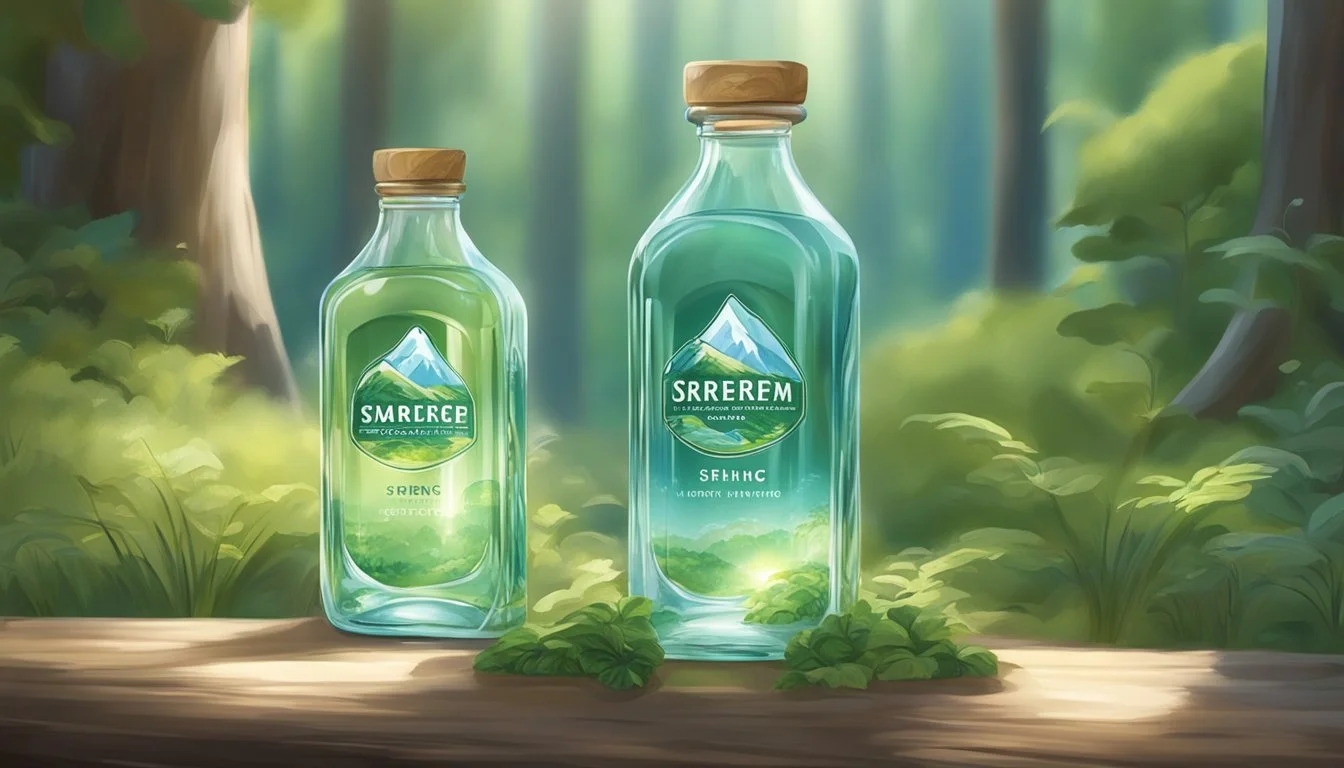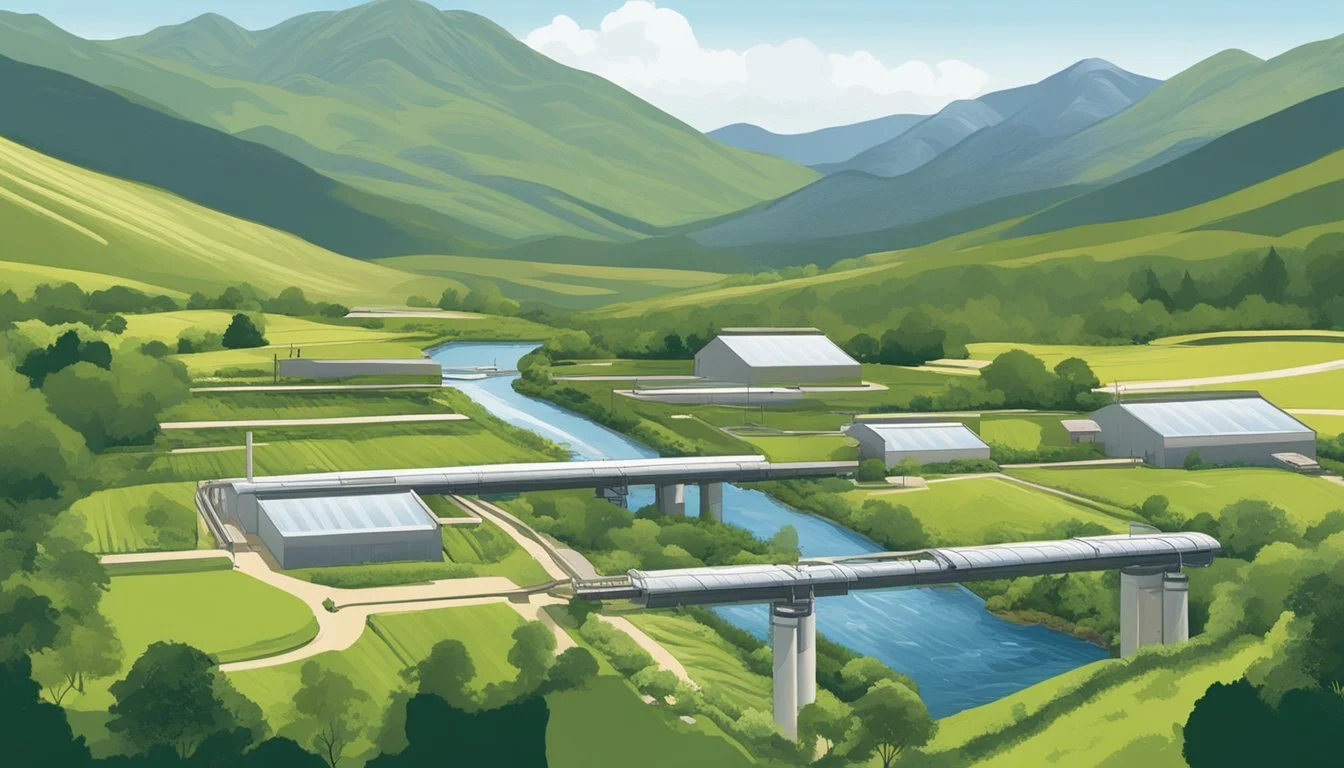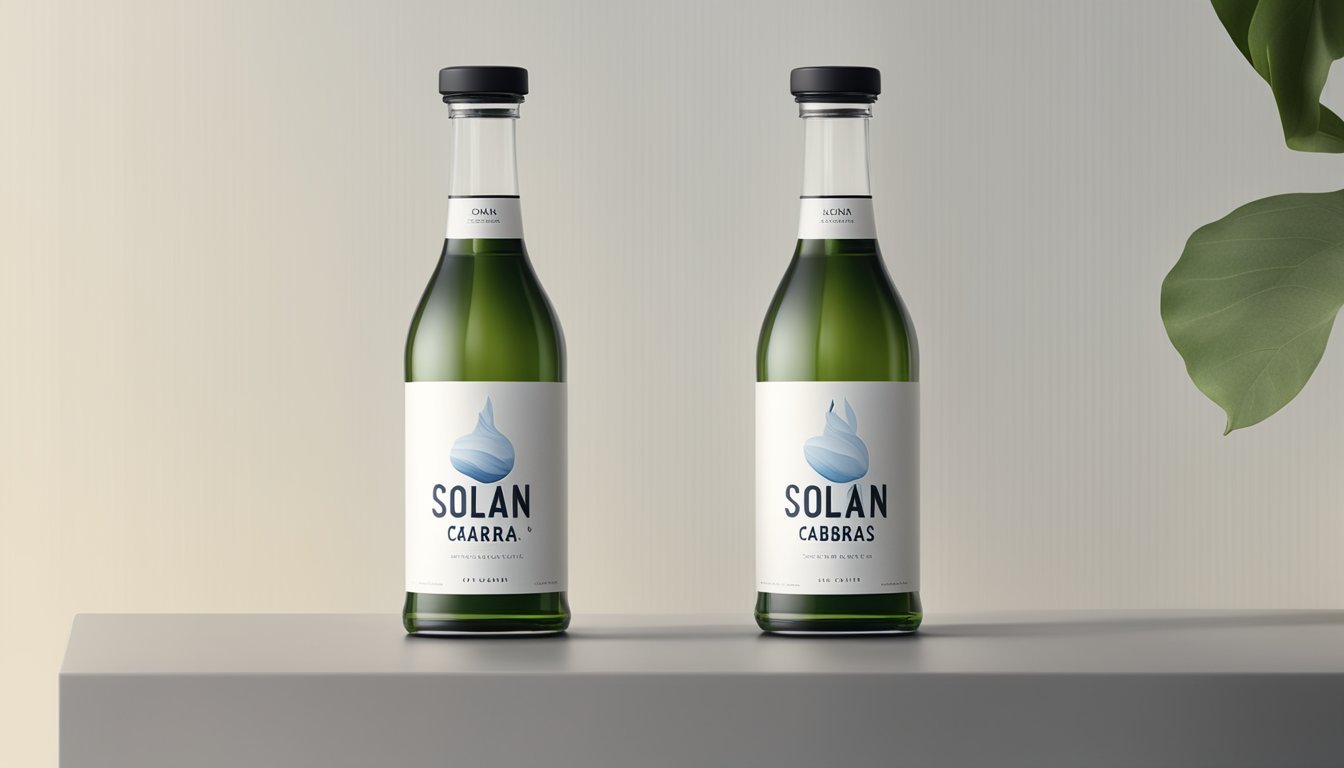Solán de Cabras vs. Ophora
Comparing Premium Bottled Water Brands
When it comes to premium bottled waters, Solán de Cabras and Ophora are two brands that stand out in a crowded market. Both offer unique qualities that cater to discerning tastes and preferences. For those seeking a rich mineral composition and a storied heritage, Solán de Cabras, with its origins in the ancient springs of Serranía de Cuenca, is a top choice.
Ophora, on the other hand, is known for its advanced oxygenation process, which promises enhanced hydration and wellness benefits. This American brand touts its commitment to providing water that goes beyond simple hydration, incorporating health-boosting technologies.
Choosing between Solán de Cabras and Ophora largely depends on whether one values traditional purity and mineral richness or innovative health benefits and high oxygen content. Both brands offer distinct experiences that promise to quench not just your thirst but also your specific wellness needs.
History and Origin of Solán de Cabras and Ophora
Solán de Cabras and Ophora are two renowned bottled water brands with distinct historical backgrounds. Their origins and development offer unique insights into their quality and significance. Here is a detailed exploration of their respective roots.
Roots of Solán de Cabras
Solán de Cabras has a history dating back over 2,300 years. Originating in the Serranía de Cuenca region of Spain, this natural mineral water has been celebrated for its purity since the Roman times. According to the water's history, thunderstorms thousands of years ago created its pristine source. This historical richness has made Solán de Cabras a symbol of authenticity and quality.
By the 18th century, the water was recognized for its medicinal properties. King Charles III of Spain even had it transported to his royal court. Today, Solán de Cabras is a benchmark for premium mineral water, known for its unique mineral composition and balanced taste.
Ophora's Emergence
Ophora, in contrast, is a relatively recent entrant in the luxury bottled water market. Originating from California, Ophora water is distinguished by its advanced purification and oxygenation processes. This innovative approach aims to provide a cleaner, more oxygen-rich drinking experience.
The water's source is meticulously protected, ensuring it maintains its natural integrity. Ophora's method of enhancing water with oxygen contributes to its reputation for health benefits and refreshment, setting it apart from traditional bottled waters. Through its cutting-edge technology, Ophora has quickly become a favorite among those seeking high-quality, pure water.
Source and Nature of the Waters
Solán de Cabras and Ophora are two premium bottled waters known for their unique origins and natural purity. This section explores the aquifer of Serranía de Cuenca and compares natural spring water to created purity systems.
The Aquifer of Serranía de Cuenca
Solán de Cabras originates from the Serranía de Cuenca mountains in Spain. The water emerges naturally from an underground aquifer situated 950 meters above sea level. Surrounded by dense forests, this aquifer maintains its purity through natural filtration processes.
The region's geology ensures that rainwater takes around 3,600 years to filter through mineral layers before reaching the surface. This extensive journey infuses the water with natural minerals, contributing to its unique taste and health benefits. The bottles used are designed specifically to protect the water from any external contamination.
Natural Springs vs. Created Purity
Natural spring water, like Solán de Cabras, is sourced directly from underground springs. This type of water undergoes a lengthy natural filtration process, which enriches it with minerals and ensures its purity. The result is a product that reflects the terroir of its origin.
In contrast, Ophora uses advanced purification systems to enhance its water. Ophora's water starts with a base of clean water, which is then subjected to a proprietary purification process. This results in water with high oxygen content and balanced minerals, offering a different kind of purity compared to natural springs.
Both methods ensure clean, high-quality water, but the source and nature of each provide distinct characteristics and benefits.
Mineral Content and Health Benefits
Both Solán de Cabras and Ophora boast a rich profile of essential minerals and electrolytes. Their unique mineral compositions contribute significantly to health benefits such as enhanced hydration, mineral balance, and overall well-being.
Essential Minerals and Electrolytes
Solán de Cabras is renowned for its balanced mineral content, offering calcium, sodium, potassium, magnesium, bicarbonate, and silica. These elements support bone health, nervous system function, and electrolyte balance.
Calcium: Aids in bone density and dental health.
Sodium: Critical for nerve function.
Potassium: Essential for heart health.
Magnesium: Supports muscle and nerve function.
Bicarbonate: Helps with digestion.
Silica: Contributes to skin and hair health.
Ophora water also provides an impressive array of minerals. It includes sulfate and chloride, further supporting digestive health and electrolyte balance. These mineral waters offer a mix of essential electrolytes that sustain physical and mental well-being.
Water and Wellness
Mineral water like Solán de Cabras and Ophora enhance hydration and promote overall wellness. Their mineral-rich content helps maintain the body's pH balance and electrolyte levels.
Solán de Cabras, with a neutral pH around 7.4, ensures smooth taste and efficient body acidity regulation. Its minimal alteration from nature preserves natural benefits.
Ophora, with its advanced purification, claims to offer superior hydration by infusing the water with extra oxygen and essential minerals. Both brands stand out for their health-promoting properties due to their pure sources and careful bottling processes.
Filtration Processes and Purity
Solán de Cabras and Ophora utilize unique approaches to achieve high purity in their bottled water. Each brand emphasizes its own methods, from natural filtration to advanced technological processes, ensuring consumers receive the best hydration available.
Natural Filtration and Mineral Composition
Solán de Cabras water undergoes centuries of natural filtration through layers of rock. This slow filtering process enriches the water with minerals such as calcium, magnesium, and bicarbonates. No human intervention occurs in this process, preserving the water's natural purity.
The water was historically treasured by Romans and goat herders for its purity and supposed healing properties. It offers a balanced mineral composition, known for its clean taste and health benefits.
In contrast, Ophora focuses on enhancing the water’s purity and mineral content through a combination of natural sourcing and added minerals.
Bottled Water and Reverse Osmosis
Ophora employs a rigorous multi-step filtration process, including reverse osmosis, ultraviolet light, and ozone treatment. Reverse osmosis is pivotal; it forces water through a semipermeable membrane to remove impurities and contaminants.
This method achieves high levels of purity, making Ophora well-regarded for its clean taste and absence of contaminants. Ophora also reintegrates essential minerals after the purification process, ensuring a balanced and refreshing taste.
Solán de Cabras, with its natural filtration method, does not require reverse osmosis. Instead, it relies on the natural processes that have proven effective over centuries, providing water that is pure and mineral-rich.
Taste Profile and Water Sommelier Insights
Solán de Cabras and Ophora are two distinct bottled waters often compared for their unique taste profiles and the expert insights from water sommeliers. Differences in acidity, minerality, and flavor, along with the art of tasting these premium waters, offer a deeper understanding of what sets them apart.
Acidity, Minerality, and Flavor
Solán de Cabras is celebrated for its balanced mineral composition, which contributes to a very smooth and refreshing taste. It has a slightly lower acidity level, making it gentle on the palate, and offers a subtle sweetness due to its natural minerals.
Ophora, on the other hand, is often praised for its high oxygen content and purity. The taste is crisp and clean, with a slightly higher acidity that enhances its refreshing quality. The minerality in Ophora gives it a distinctively pure taste, delivering a satisfying mouthfeel without bitterness.
A water sommelier might point out that Solán de Cabras and Ophora deliver contrasting experiences. Solán de Cabras feels velvety and smooth, while Ophora is sharp and invigorating.
The Art of Water Tasting
Water sommeliers evaluate bottled water much like wine, considering aspects like acidity, minerality, and flavor. For instance, when tasting Solán de Cabras, they note the gentle mineral flavor that lingers without overwhelming the senses. The moderate acidity contributes to a balanced, refreshing taste.
Ophora stands out with its minerality and higher oxygenation, providing a unique freshness that invigorates the palate. Sommeliers often describe it as having a clean, almost effervescent quality.
In conducting a tasting, it’s essential to use neutral glassware and a controlled environment to avoid influencing the taste. This comparison provides insights into how subtle differences in mineral content and water sources affect the taste and overall drinking experience.
Environmental Impact and Sustainability
Solán de Cabras and Ophora prioritize reducing their environmental impact by focusing on bottle production, recycling, carbon footprint, and transportation.
Bottle Production and Recycling
Solán de Cabras has managed to decrease its use of PET by 900,000 kg since 2013 through ecodesign initiatives. They also cut down their use of cardboard by 300,000 kg by optimizing packaging materials. This brand uses recycled materials in its bottles, emphasizing sustainability.
Ophora also shows a strong commitment to environmental stewardship. Their bottles are often made from high-quality, BPA-free materials, which contribute less to plastic waste. Ophora emphasizes using glass bottles where possible to reduce plastic pollution. Their recycling programs are designed to handle the specific challenges related to bottled water packaging.
Carbon Footprint and Transportation
Solán de Cabras employs renewable energy sources and offsets their carbon emissions through tree-planting programs. Their commitment includes reducing transportation emissions by optimizing logistics and employing more fuel-efficient delivery methods. Sustainable operations are a key focus for minimizing the overall environmental footprint.
Ophora focuses on local sourcing and production to cut down on transportation emissions. Their commitment to sustainability includes using energy-efficient technologies and prioritizing local markets to reduce long-haul transport. By minimizing the distance their products travel, Ophora aims to lower their carbon emissions significantly, fostering a more sustainable model for bottled water distribution.
Packaging and Brand Presentation
Solán de Cabras and Ophora both aim to captivate customers through their unique packaging and strategic brand presentation. Their efforts in bottle design and marketing play crucial roles in distinguishing these premium water brands.
Bottle Design and Convenience
Solán de Cabras features a striking blue glass bottle, which conveys elegance and stands out on shelves. The blue glass not only enhances its visual appeal but also protects the water from light exposure. This ensures the purity and quality of the mineral water remain intact.
Ophora opts for versatile plastic bottles, catering to on-the-go consumers. Its design is functional and lightweight, making it easy to transport. This convenience is particularly appreciated by those who lead active lifestyles and prefer portability in their water choices.
Marketing and Distribution
Solán de Cabras leverages its long history and heritage in its marketing strategy, emphasizing its roots from the Serranía de Cuenca in Spain. The brand runs targeted campaigns that highlight its rich legacy and supposed health benefits.
Ophora focuses on modern health-driven marketing. It showcases its water as oxygen-enhanced and ideal for wellness enthusiasts. Its distribution strategy includes a strong presence in health stores and upscale grocery stores, ensuring accessibility for their target market.
Consumer Preferences and Market Trends
Consumers show a growing interest in alkaline water, which is often associated with health benefits. Bottled water consumption continues to rise as people seek perceived purity and safety, overshadowing tap water usage.
The Demand for Alkaline Water
Consumers increasingly prefer alkaline water, giving brands like Solán de Cabras an edge. These waters are believed to neutralize acidity in the body, with a potential positive impact on health.
Dietary pH is a consideration for many buyers, influenced by claims that alkaline water can balance their body's pH levels. Market trends reflect this preference, as more people search for products that align with their health goals.
Brands capitalize on this demand by promoting the mineral richness and purity of their water, attracting health-conscious consumers.
Bottled vs. Tap Water Consumption
In recent years, the bottled water market has surged, driven by concerns about tap water contamination. Reports highlight a significant market growth, with global bottled water sales increasing by 73% from 2010 to 2020
Consumers often perceive bottled water, including premium brands like Ophora, as safer and of higher quality compared to tap water. This perception influences their purchasing decisions, leading to a substantial rise in bottled water consumption.
The convenience and portability of bottled water also contribute to its popularity, making it a preferred choice for many over tap water.
Comparative Analysis and Final Thoughts
Solán de Cabras and Ophora represent premium bottled water brands with unique characteristics. Solán de Cabras, originating from the Serranía de Cuenca in Spain, is known for its natural mineral composition and blue glass bottle. Its purity is a key selling point, attracting consumers who value natural water sources.
Ophora, on the other hand, undergoes a proprietary purification process. This process enhances the water with essential minerals and antioxidants. The goal is to support optimal hydration and health benefits. Ophora’s state-of-the-art facilities ensure the highest quality in bottling.
Quality and Source:
Solán de Cabras: Natural mineral water from Serranía de Cuenca, Spain.
Ophora: Purified water with added minerals and antioxidants.
Price Point:
Solán de Cabras: Positioned as an expensive option in the premium market, highlighted by its unique blue glass bottle.
Ophora: Also in the premium segment, with pricing likely reflecting the advanced purification technology.
Taste and Texture:
Solán de Cabras: Praised for its smooth taste and natural mineral balance.
Ophora: Described as having a crisp and refreshing taste, enhanced by its added minerals.
The choice between Solán de Cabras and Ophora depends on consumer preferences. Those valuing natural origins may lean towards Solán de Cabras, while consumers interested in enhanced health benefits might prefer Ophora. Both brands maintain high standards in quality and presentation, differentiating themselves within the high-end bottled water market.








